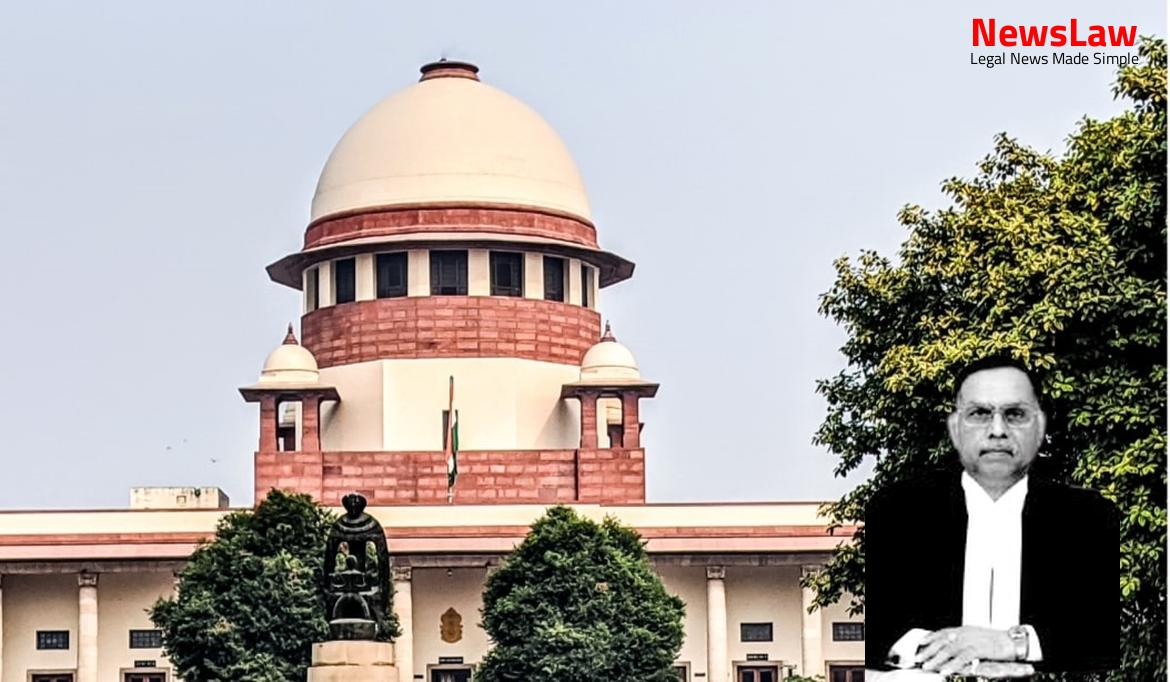Explore the nuanced legal analysis by the court regarding the interpretation of financial creditor status under the Insolvency and Bankruptcy Code. The judgment scrutinizes key provisions and definitions to elucidate the distinction between various types of creditors, shedding light on the complexity of financial debt classification. Find out more about the essential elements that determine the status of a financial creditor in this insightful examination.
Facts
- Appellant claimed to be a financial creditor of the corporate debtor based on a pledge of shares as a guarantee for financial debt.
- Adjudicating Authority rejected the appellant’s claim as a financial creditor citing Section 5(8) of the Code.
- Resolution Professional rejected the claim stating lack of a separate Deed of Guarantee in favor of the Assignor.
- Board resolution and agreements were executed regarding Non-Disposal Undertaking and Pledge Agreement for shares as security.
- Assignment of rights to the Appellant under Securitisation and Reconstruction Act, 2002 took place from L&T Infra.
- Borrower failed to repay as per agreement, leading to claim recall by the Appellant.
- Appellant filed for admission of its claim as a financial debt with NCLT Mumbai and is a party in a pending case at Debts Recovery Tribunal, Ahmedabad.
- Respondent expressed the view that the corporate debtor’s liability was confined to the pledge of shares only.
- Appellant filed a claim for a specific amount after the commencement of corporate insolvency resolution process.
- Appeal filed against NCLAT’s decision dismissing Company Appeal related to the rejection of appellant’s claim as a financial creditor of the corporate debtor.
Also Read: Analysis of Seniority Determination in Armed Forces Personnel Case
Arguments
- The appellant argues that the pledge of shares by the corporate debtor to secure the loan amounts to a guarantee.
- The liability of the corporate debtor, acting as a surety, is co-extensive with that of the debtor.
- The appellant steps into the shoes of L&T Infrastructure Ltd. due to assignment of rights and obligations.
- The appellant argues that the term guarantee should be broadly interpreted to include any security created by a third party to secure repayment, like a pledge of shares.
- The appellant highlights the potential prejudice they would face if not considered a financial creditor, as they would have no recourse during the moratorium or in case of a resolution plan without redress.
- The National Company Law Tribunal rightly rejected the claim of the appellant as a financial creditor.
- The appellant has already initiated proceedings at the Debt Recovery Tribunal, Ahmedabad.
- The Code does not mention pledge, so the appellant cannot claim their pledge agreement as a guarantee.
- The purpose and object of the Insolvency and Bankruptcy Code are different from recovery mechanisms.
- A judgment of the Bombay High Court relied upon by the appellant has no bearing on the interpretation of relevant sections.
- The respondent’s counsel heavily relies on the Jaypee Infratech case regarding financial creditor status based on mortgages created by the corporate debtor.
Also Read: Analysis of Circumstantial Evidence in Criminal Conviction
Analysis
- The Court analyzed the concept of financial creditors and financial debt in the context of the Insolvency and Bankruptcy Code, 2016.
- It emphasized that a person with only security interest over a corporate debtor’s assets does not qualify as a financial creditor.
- The distinction between ‘financial creditor’, ‘secured creditor’, ‘operational creditor’, and ‘unsecured creditor’ was highlighted.
- The essential element of disbursal against consideration for the time value of money was deemed crucial for a debt to be classified as a financial debt.
- The Court clarified that for a person to be considered a financial creditor, there must be a financial debt owed by the corporate debtor to that person.
- The analysis included referencing specific sections from the Indian Contract Act, 1872, and the Insolvency and Bankruptcy Code, 2016.
- Various agreements and definitions, such as ‘pledge’, ‘guarantee’, ‘pawnor’, and ‘pawnee’, were examined in the context of financial debt and creditor status.
- The Court differentiated between different types of creditors based on the nature of the debt and the creditor’s relationship with the corporate debtor.
- Section 5(7) defines ‘financial creditor’ as any person to whom a financial debt is owed.
- It includes a person to whom the debt has been legally assigned or transferred.
- Section 5(8) defines ‘financial debt’ as a debt disbursed against the consideration for the time value of money.
- It includes various types of financial transactions such as money borrowed against interest, issuance of bonds, lease liabilities, receivables sold or discounted, derivative transactions, etc.
- The debtor must owe a financial debt to be treated as a financial creditor.
- The agreement provides for additional security to cover any deficiencies in the obligation payment.
- The pledge created is a continuing security for the payment of the secured obligations.
- The Bombay High Court considered Section 126 of the Indian Contract Act which defines a ‘contract of guarantee’ as a contract to perform the promise of a third person in case of default, with the person giving the guarantee known as the ‘surety’.
- The High Court noted that Section 126 implies a disbursal against the consideration for the time value of money, encompassing various methods of raising money or incurring liability as outlined in Section 5(8)(a) to (f).
- The judgment also referenced previous cases of Swiss Ribbons (P) Ltd. v. Union of India and Pioneer Urban Land & Infrastructure Ltd. v. Union of India.
- Observations made in the judgment are only for deciding the claim of the appellant as the financial creditor.
- The appellant created security with 40,160 shares of GEL, but had no liability to repay the loan taken by the borrower.
- The Pledge Agreement and Agreement of undertaking executed post Facility Agreement only serve as security for the Lender-Assignor.
- The appellant is not a financial creditor of the corporate debtor.
- Miscellaneous Application was rightly rejected by the Adjudicating Authority.
- Decision of the Resolution Professional as approved by the NCLAT is upheld as correct.
- The Appellate Tribunal rejected the claim of the appellant as a financial creditor, addressing Section 5(8)(f).
Also Read: Land Compensation Dispute Under Kerala Forest Act
Decision
- Appeal is dismissed
- No merit found in the appeal
- No costs awarded
Case Title: PHOENIX ARC PVT. LTD. Vs. KETULBHAI RAMUBHAI PATEL (2021 INSC 59)
Case Number: C.A. No.-005146 / 2019



